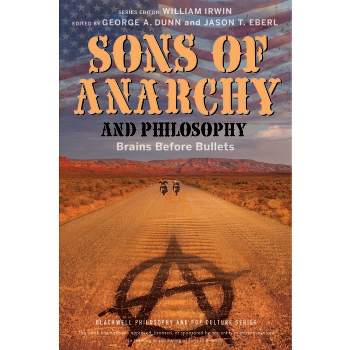Sponsored
True Blood and Philosophy - (Blackwell Philosophy and Pop Culture) by William Irwin & George A Dunn & Rebecca Housel (Paperback)

About this item
Highlights
- TRUEBLOOD and Philosophy Does God hate fangs?
- About the Author: GEORGE A. DUNN is a lecturer at the University of Indianapolis and Ningbo Institute of Technology, Zhejiang University, China.
- 256 Pages
- Philosophy, General
- Series Name: Blackwell Philosophy and Pop Culture
Description
Book Synopsis
TRUEBLOOD and PhilosophyDoes God hate fangs?
Is Sam still Sam when he turns into a collie?
Is coming out of the coffin the same as coming out of the closet?
Are all vampires created evil?
Vampires, werewolves, shapeshifters, fairies, telepaths--True Blood has it all. In a world where supernatural creatures coexist with human beings, Sookie Stackhouse and Bill Compton wrestle with powerful desires while facing complex issues concerning sex, romance, bigotry, violence, death, and immortality. Now, True Blood and Philosophy calls on the minds of some of history's great thinkers to perform some philosophical bloodletting on this thought-provoking series. From the metaphysics of mind reading to Maryann Forrester's cult of Dionysus, from vampire politics to the nature of personal identity, and from contemporary feminism to the rights of nonhuman species, True Blood and Philosophy mines the thinking of philosophers such as Plato, Aristotle, Thomas Aquinas, John Locke, Immanuel Kant, Friedrich Nietzsche, and John Rawls to enlighten us on the intriguing themes that surround this supernatural world. You'll find no shortage of juicy metaphysical morsels to sink your teeth into!
To learn more about the Blackwell Philosophy and Pop Culture series, visit www.andphilosophy.com
From the Back Cover
Does God hate fangs?
Is Sam still Sam when he turns into a collie?
Is coming out of the coffin the same as coming out of the closet?
Are all vampires created evil?
Vampires, werewolves, shapeshifters, fairies, telepaths--True Blood has it all. In a world where supernatural creatures coexist with human beings, Sookie Stackhouse and Bill Compton wrestle with powerful desires while facing complex issues concerning sex, romance, bigotry, violence, death, and immortality. Now, True Blood and Philosophy calls on the minds of some of history's great thinkers to perform some philosophical bloodletting on this thought-provoking series. From the metaphysics of mind reading to Maryann Forrester's cult of Dionysus, from vampire politics to the nature of personal identity, and from contemporary feminism to the rights of nonhuman species, True Blood and Philosophy mines the thinking of philosophers such as Plato, Aristotle, Thomas Aquinas, John Locke, Immanuel Kant, Friedrich Nietzsche, and John Rawls to enlighten us on the intriguing themes that surround this supernatural world. You'll find no shortage of juicy metaphysical morsels to sink your teeth into!
To learn more about the Blackwell Philosophy and Pop Culture series, visit www.andphilosophy.com
Review Quotes
Can John Locke's memory theory explain the nature of vampire identity? Is there a PETA message buried in True Blood's take on vampire-human relations? These and other biting issues constitute the smart and amusing essays in the latest William Irwin-edited Blackwell Philosophy and Pop Culture Series (after Mad Men and Philosophy). Authors invoke the likes of Kant, Sartre, and Freud and approach their topics with the seriousness of a devoted fan balanced with the levity and wit the series is known for. More than one essay focusing on God and vampires duplicate efforts, but highlights include Christopher Robichaud's examination of consent in creating a vampire, William M. Curtis's discussion of metaphor and the mainstreaming of blood suckers, Ron Hirschbein's exploration of the "Edible Complex," and Patricia Brace and Robert Arp's analysis of the not-so-subtle similarities between vampire rights and gay rights. These easily-digestible philosophical morsels are perfect for fans of Jon Stewart and anyone else who likes to laugh while they learn. (June) (PW.com, August 16, 2010)
About the Author
GEORGE A. DUNN is a lecturer at the University of Indianapolis and Ningbo Institute of Technology, Zhejiang University, China. He contributed to Battlestar Galactica and Philosophy, X-Men and Philosophy, Terminator and Philosophy, Twilight and Philosophy, Alice in Wonderland and Philosophy, Iron Man and Philosophy, and Mad Men and Philosophy.
REBECCA HOUSEL, a former professor of writing and popular culture, is now an author and editor serving on editorial advisory boards for the Journal of Popular Culture and the Journal of American Culture. She coedited Twilight and Philosophy and X-Men and Philosophy.
WILLIAM IRWIN is a professor of philosophy at King's College. He originated the philosophy and popular culture genre of books as coeditor of the bestselling The Simpsons and Philosophy and has overseen recent titles, including Batman and Philosophy, House and Philosophy, and Alice in Wonderland and Philosophy.











